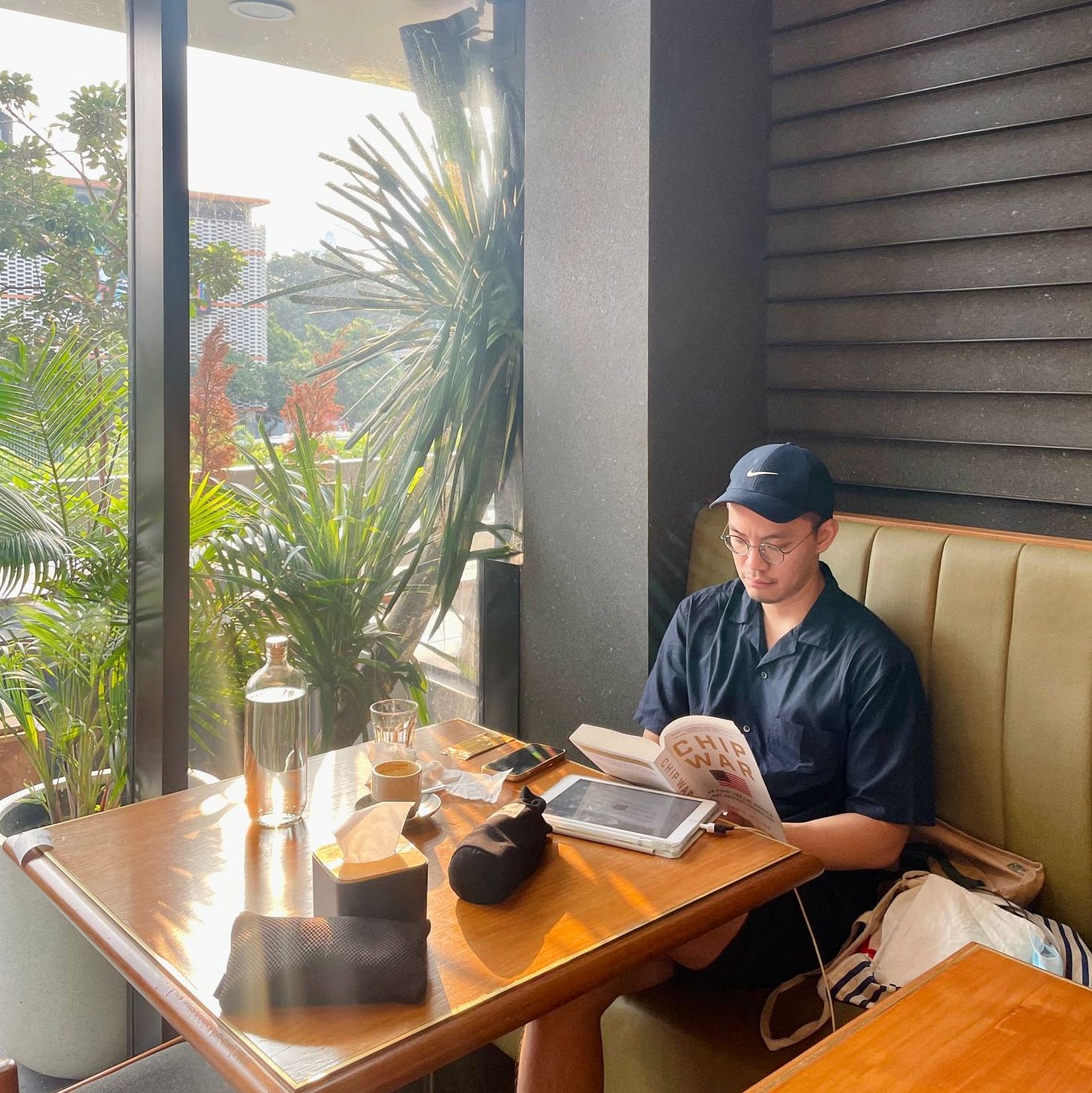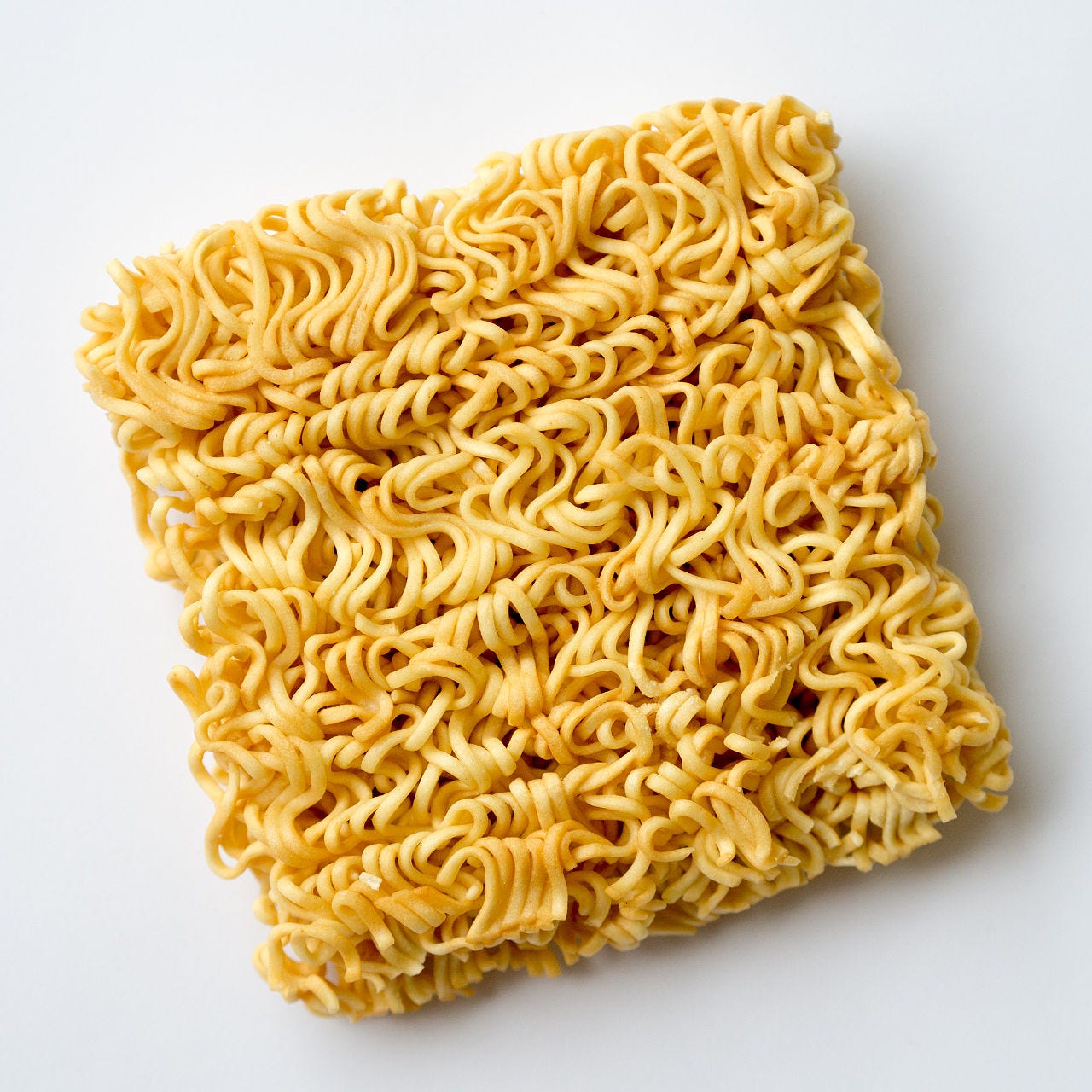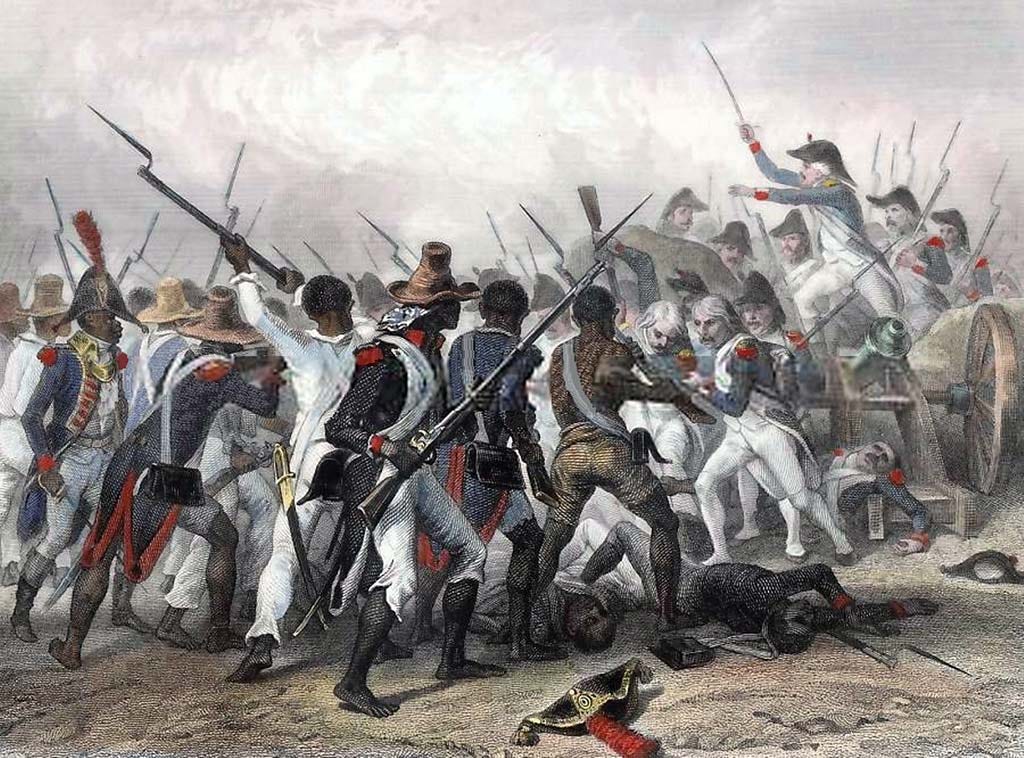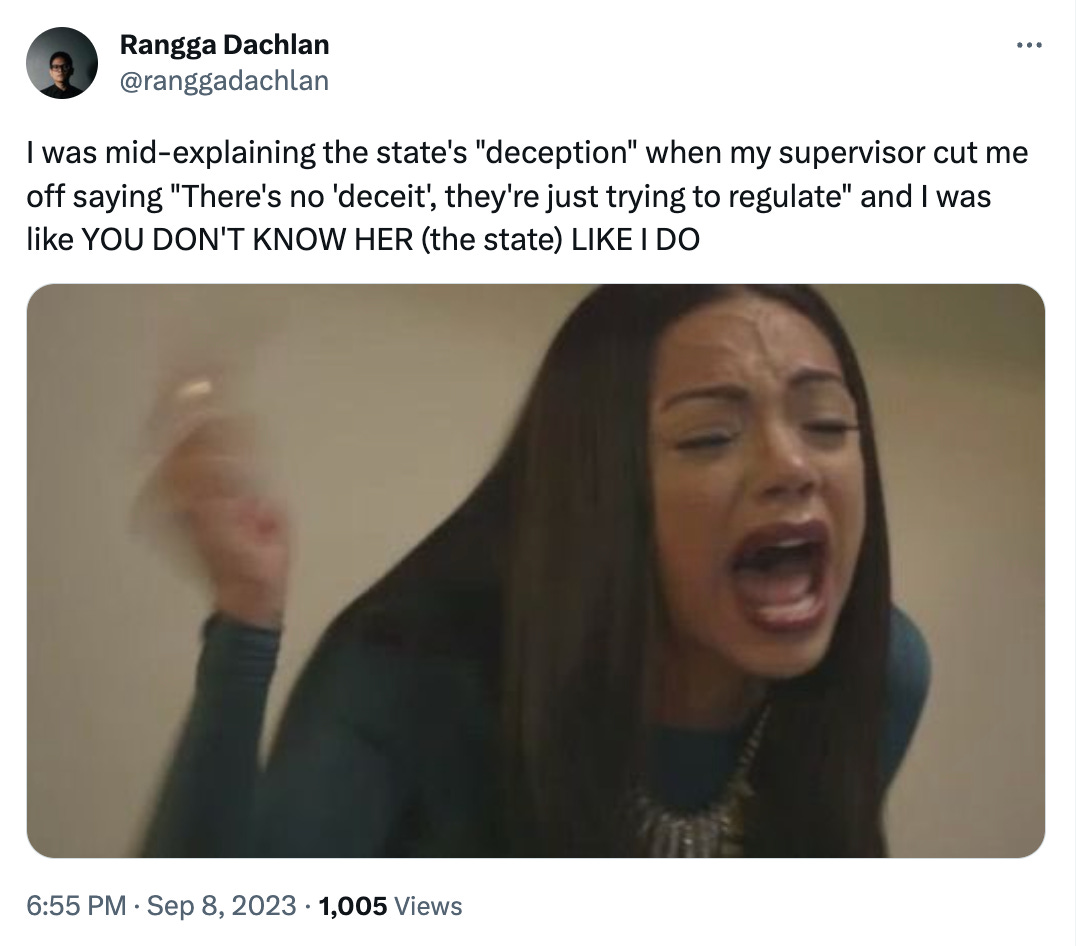Rocky thinks about the Byzantine Empire every day
The Debrief with Rocky Intan, PhD student at University at Albany
Welcome to The Debrief, the Monday edition of this newsletter where I ask people to share their burning thoughts and interest in hopes of expanding my own. It is, in fact, a Tuesday by the time you get this in Jakarta. But, hey, it’s still Monday somewhere. It is especially still Monday in Albany, New York, which is where today’s interviewee is based.
This week I have Rocky, who is one of those friends who features so prominently in my life that any attempt to describe him sounds meh, because how do I tell you he is literally EVERYTHING?
I guess the shortcut to talking about Rocky would be to say that he is one of the biggest nerds you will ever know — and that wouldn’t be wrong. He doom scrolls Wikipedia. He inserts Byzantine empire trivia into any conversation. A random text from him sounds like “this wind turbine at this power plant is so sexy” or something like that. The following interview will be filled with proof of his big brain energy. Yet even all that would be selling him short.
It is perhaps more accurate to say that it wasn’t until I met Rocky that I realized it is possible for one to know a lot about the world and not be an asshole. It is possible to be informed and not demand the world congratulate you. You can love knowledge without making “knowing” your entire personality. He showed me a way of learning that would forever redefine “smart” for me.
Maybe it’s undiagnosed ADHD, maybe it’s something else, but Rocky is one of those people whose brain is simply wired to hyperfixate, and so whether that’s the rise and fall of empires or old details of a story you told him years ago, you can count on him to pay attention and remember like no other.
Rocky is a PhD student at University at Albany majoring in political science with an interest in international politics and global economy. Prior to pursuing his PhD, he was a researcher at the Jakarta-based Center for Strategic & International Studies (CSIS).
1. What’s an unpopular opinion that you feel strongly about?
Indomie is overrated.
Don’t get me wrong, I think it’s great and I genuinely love Indomie. It’s just that in the pantheon of instant noodles, it’s not that special. I swear to god. Other brands like Mama, Nissin, Maruchan, Jjapaguri, all of those are great, and in certain moments or situations when you need them, they do taste better than Indomie. Again, my point isn’t that one is better than the other. They’re all great, especially the ones from Asia, because I think our taste buds are similar. But there isn’t anything inherently superior about Indomie, I think what we love about Indomie is more sentimental.
People blaming capitalism as a meme. It annoys me when people blame capitalism for everything, which is very vogue in the rise of the online left. “Omg I can’t believe I have to wake up and work 9-to-5 today, I hate capitalism.” That’s the modern economy. That’s industrialization. That’s the modern world. I’m pretty sure you’d have to work under communism too.
The things people are complaining about are often the fault of the government; the lack of healthcare, insurance being expensive, there are specific government policies that enabled that. When taxes are high but our infrastructure remains appalling, that’s not capitalism, that’s failure on the government’s part. When you’re complaining about your landlord, that’s your government not having good renter’s protection policies. There are capitalist societies that do not have those problems. Those problems are specific to countries who have a laissez-faire approach. Social democratic capitalist societies deal with those problems.
Another thing that annoys me is when some people complain this way, what some of them are implicitly arguing for is what people call “pastoralism”, a degrowth to a world with less industrialization and a return to nature, to subsistence living. But they won’t say this out loud because advocating for everyone to be poorer isn’t popular. And most people do understand there is a trade-off between subsistence farming and the modern industrial economy and the negatives are outweighed by the positives, for example: specialization, less dependence on the whims of nature, and rise in living standards.
So we end up with either reflexive complaints or dishonest critiques on capitalism that are misplaced. I get that we all need to vent and posture, but a solution-oriented complaint would be nice once in a while.
2. What’s something you’re currently obsessed with?
I listen to a lot of history podcasts. The ones that I have in heavy rotation are “History of Byzantium”, “History of Rome”, and “Revolutions”, which covers a bunch of revolutions in the western world.
My favorite seasons from the “Revolutions” podcast are the Haitian Revolution and the French Revolution. While the French Revolution is perhaps socio-economically and politically the most influential revolution in the western world at the time, the Haitian Revolution was a total blindspot for me.
We could arguably say all the other revolutions are middle-class people revolting against their monarch, meanwhile the Haitian Revolution is about slaves revolting against their masters and trying to control their own destiny with all the bumps along the way. It’s very interesting and also very terrifying, to be honest.
This is not current, but I’m obsessed with the Byzantine Empire.
The Byzantine Empire is the name historians use to call the eastern half of the Roman Empire that survived. It was based in Constantinople; its core territories roughly covered modern-day Greece, Turkey, and south Balkans. The empire’s period spanned roughly more than a millennium. It experienced periods of revival and decline before being conquered for good by the Ottoman Empire and I am obsessed with how it refused to die.
Let me quote Robin from the History of Byzantium podcast on this:
There’s a difference between the history of Rome and the history of Byzantium. Although that story ended with the fall of the West, I think the main narrative is about the brilliance of Rome’s expansion. The heart of that story is about the principles and the work ethic of one city, coming to define an entire continent and civilization.
I think the Byzantine story is going to be more Sisyphian. You know the story of Sisyphus, right? From Greek mythology. He was a man forever forced to roll a boulder to the top of the hill, only to watch it fall back down again and start all over. That, in a way, is what defines the Byzantine story. Emperor Justinian recovers western provinces against expectations and the Black Death wipes out a third of his people. Emperor Heraclius uses all his strength to get that boulder to the top of the hill and the followers of Muhammad appear almost instantly to shove it back down again. The Byzantines would spend centuries pushing the boulder painfully towards the summit, only to run into the Turks soon after. And when the Crusaders look like they would put their weight behind the effort, they turn out to be just as capable of shoving it back into a roll.
You could look at that story and their efforts as a great tragedy, a futile effort to see that boulder just tumble back past you. Or you could admire the effort… Maybe the gods wanted that boulder to crush the Romans long ago, but they just kept pushing it back up the damn hill.
(Editor’s Note: Rocky promises to take on a date any guy who can tell him which episode of the “History of Byzantium” podcast the above quote came from.)
I’m fascinated by how countries name themselves and how these names often differ from how other countries see them. For example, Germany is “Deutschland”, China is “Zhōngguó”. This fascination was re-triggered due to India insisting on it being called “Bharat” during the G20. It’s always interesting when certain countries insist on being called by their “own name” (the way the Turkish government insists that they can only be called “Turkiye”), because while I guess it’s great for them, there are usually domestic political agendas behind them.
Most of the time, the way people refer to certain countries also has to do with their linguistic roots. “Greece”, for example, is English, and the English got that from the Romans, from Latin, “Grecia”, because that’s the first Greek tribe that the Romans met. Meanwhile in the east, like Indians and Persians, their first encounter was with the Ionian tribe of Greece. This Ionian tribe, I think maybe it’s the Arabs who first called them “Yunan”, which is where our Indonesian word for the country “Yunani” comes from. I just love that.I’m obsessed with watching videos at 1.25x speed, which seems to be the exact speed on which my brain runs. I really can’t stream movies, Netflix, HBO, YouTube, or even Twitter videos at normal speed anymore.
It’s been liberating to discover this about myself, to be honest, because for years I was told that I either have bad public speaking skills, or I’d be laughed at for not having a clear train of thought? I realized now that my brain just runs too fast, not in a good way.
3. Who’s someone you think more people should know about?
Rangga Dachlan, a law lecturer at Universitas Gadjah Mada currently doing his PhD at Oxford. Someone on Twitter who is smart, genuinely funny, and not mean, with just the right amount of neuroses? He’s your guy. When I’m just looking for a good laugh, there are days I’d just go over to his Twitter. Bonus points if you also like Prometheus and Dune.
Another person that I think more people should know about is Paul Poast, who is an international relations professor. At least three out of five of his threads are in my bookmarks. They’re always so well-narrated and well-sourced.
Bonus round: there are two journalists I follow religiously on Twitter, and those are Alan Beatie, who tweets about international trade, and Shashank Joshi, who tweets about defense and is especially relevant in relation to the Ukraine war. They’re concise in their writing and from their tweets, you can tell their writing on their respective publications is basically 1/4th of their research, which is a good rule of thumb they’re doing their homework right.
4. What’s a life hack or advice that recently changed your life?
Better to say “oh well” rather than wallow in “what ifs” later on. When choosing between doing and not doing something, I’d rather do and embrace the possibility of not getting what I want despite having tried, rather than not try at all. Of course you’d still have to thoroughly think things through, but when it comes down to it, just go for it.
A good friend once told me that if you don’t try then you have a 0% chance of getting what you want. But if you try, you might have a 10% chance of getting it. It’s so basic, but I feel like it particularly helps me weigh the course of action I’d regret the most, because apparently regret is a pretty powerful motivating thing to me.
This is all a very PG-13 way of saying “just fuck around and find out”.
5. What are you most excited about in the next week?
If you had asked me last week, I’d tell you I was excited about going to New York City, a two-hour bus ride away from where I am. But this week? I’m just studying, doing my classes, and my readings…
The Debrief is the Monday installation of this newsletter. Visit past Debriefs with Erin who nerded out about Asean , Avi who talked about gatekeeping and Vero who hates ambient music. On Wednesdays, I tend to publish essays. On Fridays, I send out a brief pleasure list.







